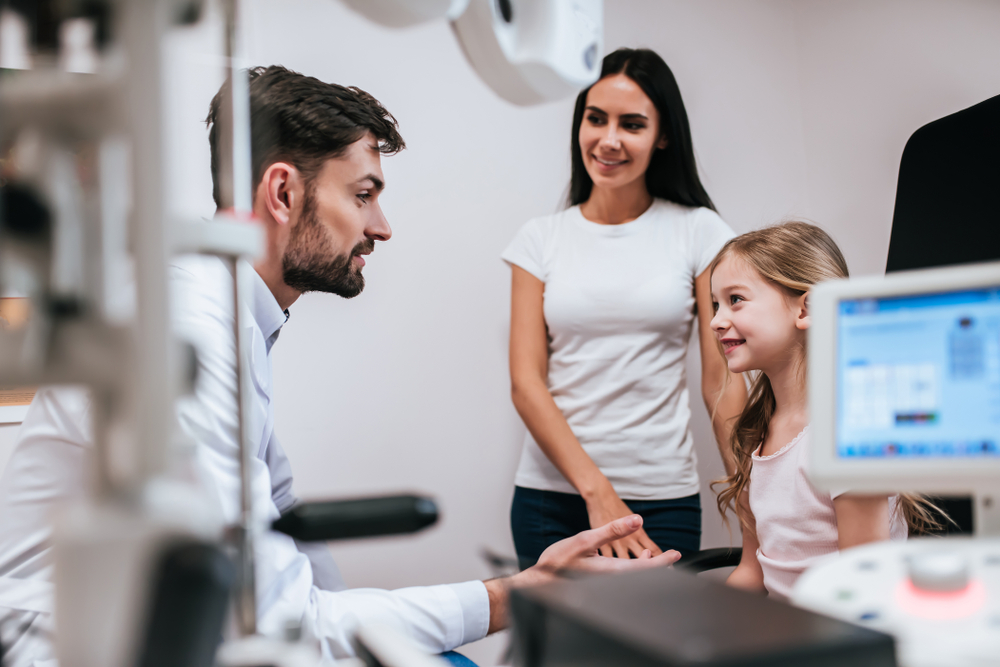
Myopia is a common vision problem that affects many children. It occurs when the eye is unable to focus on distant objects, resulting in blurred vision. Understanding the causes and symptoms of myopia in children is essential for parents to effectively manage this condition.
What Are the Causes and Symptom of Myopia?
Myopia in children can be influenced by both genetic and environmental factors. If one or both parents have myopia, there is an increased likelihood that their children will develop it as well. Additionally, excessive near work, such as prolonged reading or using electronic devices, can contribute to the development of myopia in children.
Some common signs include squinting, headaches, eye strain, and sitting too close to the television or computer screen. If you notice any of these symptoms in your child, it is important to schedule an appointment with an optometrist for a comprehensive eye examination.
The Importance of Myopia Management for Children
Managing myopia in children is essential to prevent its progression and associated complications. If left unmanaged, myopia can worsen over time, leading to higher levels of nearsightedness and an increased risk of developing eye conditions such as cataracts, glaucoma, and retinal detachment later in life.
There are various methods available for myopia management in children that can help slow down the progression of nearsightedness. By implementing these strategies, parents can significantly reduce the risks associated with myopia and safeguard their children's vision.
Tips for Parents to Prevent the Progression of Myopia in Children
As a parent, there are several proactive steps you can take to prevent the progression of myopia in your child:
- Encourage outdoor activities: Spending time outdoors has been shown to have a protective effect against myopia development. Encourage your child to engage in outdoor activities like sports, nature walks, and playground games.
- Limit screen time: Excessive screen time can contribute to the development and progression of myopia. Set reasonable limits on the amount of time your child spends on electronic devices and encourage breaks to rest their eyes.
- Ensure proper lighting: Adequate lighting is important for visual comfort and health. Make sure your child's study area and other frequently used spaces are well lit to reduce eye strain.
- Promote healthy habits: Encourage your child to adopt healthy habits, such as taking regular breaks from near work, maintaining a balanced diet rich in eye-healthy nutrients, and getting enough sleep.
- Schedule regular eye exams: Comprehensive eye exams are crucial for monitoring the progression of myopia, implementing effective management strategies, and ensuring the ongoing health and well-being of their eyes.
By implementing these tips, you can play an active role in managing your child's myopia and promoting their overall eye health.
Myopia Management Methods for Children
Bifocal spectacles, which consist of two different optical powers in a single lens, have been used as a traditional method for myopia management in children. They are designed to correct both distance and near vision, helping to reduce the eye's demand for focusing and potentially slowing down the progression of myopia.
Multifocal contact lenses are another effective method for managing myopia in children. These lenses have multiple optical powers, allowing for clear vision at different distances. Similar to bifocal spectacles, multifocal contact lenses aim to reduce the eye's focusing demand and slow down the progression of myopia. One advantage of multifocal contact lenses is their convenience and ease of use, especially for active children who participate in sports or other physical activities.
Orthokeratology, also known as Ortho-K, is a non-surgical method for managing myopia in children. It involves wearing specially designed gas-permeable contact lenses overnight, which temporarily reshape the cornea to correct the child's vision. The cornea retains its reshaped state during the day, providing clear vision without the need for glasses or contact lenses.
Schedule Your Child’s Eye Exam with STC Optometry Today
Managing myopia in children is a crucial responsibility for parents to protect their children's vision and prevent the progression of nearsightedness. By understanding the causes and symptoms of myopia, parents can take proactive steps to promote healthy vision habits and implement effective myopia management methods.
Consult with our optometrist to determine the most suitable method for your child based on their individual needs and eye health. By taking action early and implementing appropriate myopia management strategies, parents can play a vital role in preserving their children's vision for a lifetime.
For further guidance on myopia management or to schedule your child’s eye exam, visit STC Optometry at our office in Scarborough, Ontario. Call (647) 361-5600 to book an appointment today.






